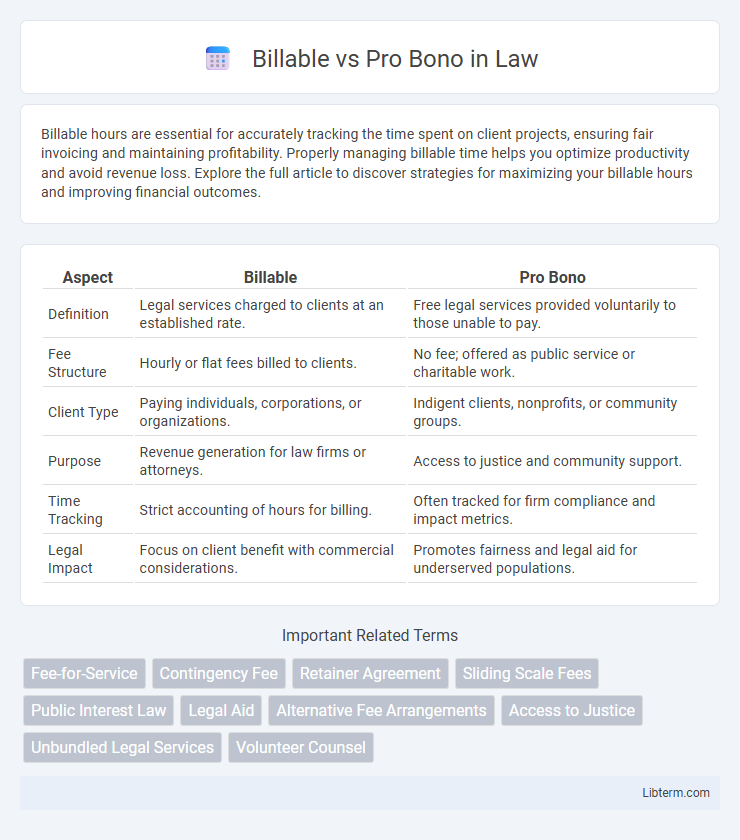Billable hours are essential for accurately tracking the time spent on client projects, ensuring fair invoicing and maintaining profitability. Properly managing billable time helps you optimize productivity and avoid revenue loss. Explore the full article to discover strategies for maximizing your billable hours and improving financial outcomes.
Table of Comparison
| Aspect | Billable | Pro Bono |
|---|---|---|
| Definition | Legal services charged to clients at an established rate. | Free legal services provided voluntarily to those unable to pay. |
| Fee Structure | Hourly or flat fees billed to clients. | No fee; offered as public service or charitable work. |
| Client Type | Paying individuals, corporations, or organizations. | Indigent clients, nonprofits, or community groups. |
| Purpose | Revenue generation for law firms or attorneys. | Access to justice and community support. |
| Time Tracking | Strict accounting of hours for billing. | Often tracked for firm compliance and impact metrics. |
| Legal Impact | Focus on client benefit with commercial considerations. | Promotes fairness and legal aid for underserved populations. |
Understanding Billable and Pro Bono Work
Billable work refers to tasks and services that professionals charge clients for based on hourly rates or fixed fees, generating direct revenue for their business or firm. Pro bono work involves offering legal, consulting, or professional services free of charge to individuals, nonprofits, or communities that lack financial resources. Understanding the balance between billable hours and pro bono contributions is crucial for maintaining profitability while fulfilling ethical and social responsibilities.
Key Differences Between Billable and Pro Bono Hours
Billable hours refer to the time a professional spends on tasks directly chargeable to a client, generating revenue for the firm, whereas pro bono hours are unpaid services offered voluntarily for public good or charitable causes. Billable work is meticulously tracked and invoiced, reflecting the economic value of the attorney's or consultant's time, while pro bono hours contribute toward fulfilling ethical responsibilities and enhancing community impact without financial compensation. Understanding the distinction is crucial for law firms and consulting agencies to balance profitability with social responsibility and accurately report productivity metrics.
Importance of Billable Work in Legal Practice
Billable work in legal practice is crucial as it directly generates revenue and sustains the financial health of law firms, enabling them to cover operational costs and invest in growth. Accurate billing ensures transparency and accountability, fostering trust with clients and supporting firm profitability. Prioritizing billable hours helps legal professionals manage workload efficiently while maintaining high-quality service delivery.
The Value of Pro Bono Services to Communities
Pro bono services provide essential legal, medical, and consulting support to underserved communities, bridging gaps where billable resources are unavailable. These services enhance access to justice and critical care, fostering social equity and community resilience. By dedicating professional expertise without charge, organizations contribute to sustainable development and empowerment in vulnerable populations.
Ethical Considerations in Billable vs Pro Bono Work
Ethical considerations in billable vs pro bono work revolve around maintaining client confidentiality, avoiding conflicts of interest, and delivering competent representation regardless of payment. Lawyers must ensure that pro bono services uphold the same professional standards as billable work to protect clients' rights and trust in the legal system. Balancing equitable access to justice with the financial sustainability of legal practice reflects core ethical responsibilities in both contexts.
Balancing Billable and Pro Bono Commitments
Balancing billable and pro bono commitments requires strategic time management to ensure revenue-generating work meets firm targets while fulfilling social responsibility goals. Effective allocation involves setting clear priorities and tracking hours separately to maintain profitability without compromising client access to free legal services. Law firms benefit from integrating pro bono efforts into performance metrics to encourage sustained engagement alongside billable hour expectations.
Impact on Career Development: Billable vs Pro Bono
Billable work directly contributes to measurable career advancement by demonstrating productivity and generating revenue, which are highly valued by employers and essential for promotions. Pro bono work enhances professional reputation and develops skills in diverse areas, fostering networking opportunities and personal growth that may not be immediately quantifiable in career metrics. Balancing billable hours with pro bono engagements can create a well-rounded portfolio, showcasing both technical expertise and commitment to social responsibility.
Client Relationships in Billable and Pro Bono Cases
Billable cases strengthen client relationships by providing structured, legally accountable services that ensure clients receive value commensurate with fees, fostering trust through transparency and professionalism. Pro bono work enhances reputational capital and social impact, building goodwill and long-term loyalty among underserved communities and potential paying clients. Firms balancing both approaches cultivate comprehensive client engagement, blending revenue generation with ethical commitments.
Reporting and Tracking Billable vs Pro Bono Hours
Accurate reporting and tracking of billable versus pro bono hours ensure efficient resource allocation and financial transparency within legal and consulting firms. Advanced time-tracking software integrates seamless categorization, enabling clear differentiation between revenue-generating billable activities and non-revenue pro bono services. Comprehensive reports highlight productivity trends and support strategic decision-making by quantifying contributions in both compensable and charitable work sectors.
Future Trends in Billable and Pro Bono Legal Work
Future trends in billable legal work emphasize automation and AI-driven analytics to enhance efficiency and client billing accuracy. Pro bono legal work is expected to expand through digital platforms connecting lawyers with underserved communities, increasing accessibility and impact. Hybrid models integrating billable and pro bono efforts will foster corporate social responsibility while maintaining firm profitability.
Billable Infographic

 libterm.com
libterm.com